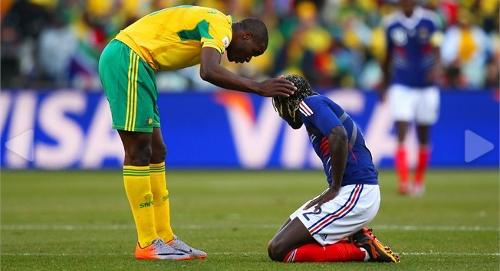I spent some time talking with a Radio New Zealand reporter, who I must say is very well versed in the politics of the region, reflecting on the de facto admission of France into the Pacific Island Forum. Unlike the usual media sound bites, he gave me some room to reflect.
Cheese Eating Surrender Monkeys Go Troppo.
Who would have thunk it? The country vilified by US neo-imperialists as cowardly appeasers of dictatorship a few years ago has now morphed into an avid neo-imperialist of it own. France is currently engaged in three low intensity conflicts, in Afghanistan, Ivory Coast and Libya, and has taken a leading role in two of them (Ivory Coast and Libya). All three military interventions are wars of choice rather than necessity (since no core French strategic interest is at stake) authorised by UN Security Council Resolutions that were championed by France as a UNSC permanent member (people may not know it but the resolution to enforce a “no fly” zone in Libya was sponsored by France, the UK and Lebanon. The US merely voted in favour. Although it is obvious that diplomatic machinations were/are at play, the very fact that the US is willing to take a back seat on the issue–as it did with the Ivory Coast resolution–perhaps indicates that it has rediscovered the art of diplomatic nuance after years almost a decade of Fox-news style bully approaches to international politics).
More interestingly, although domestic support for French involvement in Afghanistan is low (the French have lost 40 troops in that mission), popular approval of the Ivory Coast and Libyan interventions is high. Only minority Left and Islamic groups have spoken out against them; all others have essentially agreed to the use of force.
It is worth pondering why this is. Most analysts claim that the French military adventures were ordered by President Nicolas Sarkozy as a way of of bolstering his sagging electoral support in the build up to the April 2012 national elections (a fact confirmed not only by Sarkozy’s popularity rating of below 30 percent but also by the resounding defeat suffered by his UMP party in nation-wide local elections held last month–a defeat that saw the UMP not only lose to the Socialists but also to the far-right National Front). Thus his war-mongering is seen as a way of shoring up conservative-nationalist support in the face of the National Front challenge, something also seen in the anti-Islamic and anti-immigrant tone of his proposed amendments to internal security and civil rights legislation.
What is also interesting is the French public attitude, which appears to celebrate the resurgence of French militarism. Perhaps it s due to a sense of re-claimed national glory. Perhaps it is due to a sense of reaffirming France’s pride of place within the European community (where it has been eclipsed by Germany once again) or even vis a vis the US. Perhaps it speaks to a sense of French manifest destiny, now re-written. But contrary to many other countries that have sizable anti-war movements protesting their government’s involvement in foreign military adventures, in France there is little enthusiasm for protest of this sort. The majority of the French, it seems, are happy to support neo-imperialism. Either that, or they may have spent too much time in the sun.
It is further of note that France’s bellicosity has not met with the wave of international condemnation that often greets US militarism. This could be due to the fact France’s armed interventions have the UN “seal of approval,” Â are justified on humanitarian grounds and/or tend to occur in former colonies or where it has had a historical presence. Perhaps it is due to the relatively small scale and scope of their operations. Perhaps it is due to more international tolerance for French military adventurism than for US armed interventions. Whatever the reason, it appears that at home and abroad the French turn to foreign military adventurism has more support than is the case for other large powers.
In France, this speaks to the idiosyncracies of local political culture. In the international arena it may reflect a common belief that some nation other than the US needs to assume a global constabulary role, even if as a deputy sheriff. Whatever the reason, it looks like the French are cheese eating surrender monkeys no more. Oh, to be a fly on Don Rumsfeld and Dick Cheney’s wall!
It might be unpatriotic to say so, but …
… the All Whites’ unbeaten record at the FIFA World Cup was not the tournament’s greatest underdog performance. That accolade should go to the hosts, for beating France, who were a perfect illustration of all that’s wrong with football in 2010. High-strung Ferrari-driving show-ponies who failed to perform and behaved like rebellious toddlers when expected to do so; led by dictatorial, egomaniac management who refused to accept the results of their own uselessness with any sort of humility.
South Africa were ranked second-lowest in the tournament, lower even than the All Whites, and they demonstrated that if you hang tough and play as a team you can beat a side which, on paper, is far better than you are (and keep them out of the second round). The footballing world owes South Africa a rich debt of gratitude, not only for organising what was by all accounts a cracking tournament, but for humiliating France.

A fitting end to a tournament for which they shouldn’t have qualified in the first place.
L
